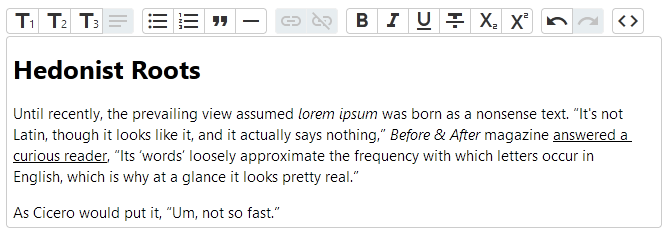django-prose-editor – Prose-editing component for the Django admin
During the last few days I have been working on a prose-editing component for the Django admin which will replace the basically dead django-ckeditor in all of my projects. It is based on ProseMirror, in my opinion the greatest toolkit for building prose editors for the web.
Here’s a screenshot:

django-prose-editor is in active development; it’s available on PyPI and is developed in the open here on GitHub. The version at the time of writing is 0.2, and it’s not yet used in production environments, only in staging/preview environments. That will soon change though.
Researching alternatives to django-ckeditor
I have spent a lot of time evaluating alternatives. All of them are great choices, and I don’t want to bash any of them. But, I didn’t feel good betting on any of the choices from the WYSIWYG editors grid on Django Packages.
A few packages have potential licensing issues. CKEditor 5’s change to the GPL is what basically killed django-ckeditor. The upcoming TinyMCE 7 version will also change to the GPL according to the TinyMCE GitHub repository. Froala only has a free trial. The django-summernote app doesn’t have a dedicated maintainer, so I wouldn’t bet on it. django-prose uses Trix; there are various reasons why I didn’t want to bet on Trix, among them my personal experience that it sometimes gets into a buggy state where only a full page reload unfreezes the editor.
Other packages are basically Markdown editors. I like Markdown and use it for my blog. I don’t think Markdown is a good choice for a CMS which is used by people of many different skill levels. I don’t want to teach people to use the Markdown link syntax or the heading syntax even if the editor helps out a bit.
Some of the remaining choices are using JavaScript widgets which haven’t been updated for a really long time or they are really code editors, not WYSIWYG editors, also a no go.
Deciding on going with ProseMirror
I have worked with ProseMirror on and off since October 2015, soon after the crowdfunding ended. It is used in a project where people can write their own book with a standardized pipeline and process, where the technical side of the project is implemented using Django, ProseMirror and LaTeX. A hacked prosemirror-example-setup still is good enough for this project.
The ProseMirror deep dive came much later, only a few years back, when implementing an editor with more custom functionality such as annotations, different ways of marking up text and even interactive elements within the text, for example to use it as a cloze in teaching materials.
The learning curve is steep. I haven’t worked with another library which was so hard to get started with. It is my conviction that the reason for this is that rich-text editing is actually a hard problem. The ProseMirror architecture and implementation definitely makes sense when it finally clicks.
As additional bonuses the ProseMirror community is nice and ProseMirror is used in a few large software projects which make me believe that the software has a non-zero probability of being maintained in the long run.
Current plans
The only thing which is configurable right now is the server-side sanitizing of submitted HTML content. I plan on allowing some configurability, for example to disable links when the content will only be used inside a card teaser which itself is already a link. Too much configurability isn’t a good thing though in my mind, so I’ll probably be slow to add features and rather keep complexity low.
I’m definitely interested to hear from people who want to use the package but cannot do so right now or who would want some additional features. Issues and pull requests are welcome!